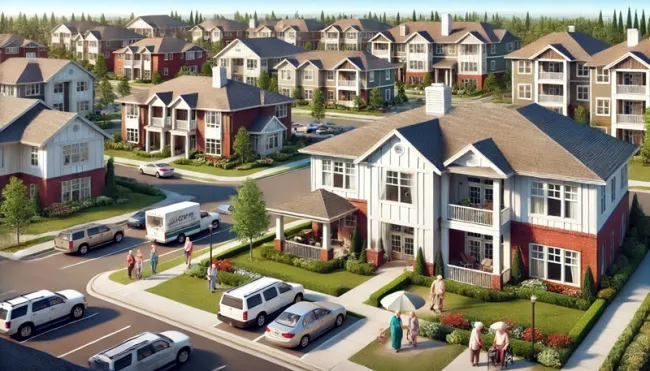As the Baby Boomer generation reaches retirement age, age-restricted communities have become increasingly popular. These communities, often designed for individuals aged 55 and older, offer a unique lifestyle tailored to the needs and desires of retirees. If you're considering moving to an age-restricted community, it's essential to understand the benefits and potential drawbacks to make an informed decision.
What Are Age-Restricted Communities?
Age-restricted communities, sometimes referred to as 55+ communities or active adult communities, are residential areas that limit residency to individuals of a certain age group, typically 55 years or older. These communities are designed to cater to the lifestyle preferences of older adults, providing amenities, services, and a social environment conducive to an active and enjoyable retirement.
Pros of Age-Restricted Communities
- Tailored Amenities and Services:
- These communities often offer a wide range of amenities specifically designed for older adults, including fitness centers, swimming pools, golf courses, walking trails, and clubhouses. Many communities also provide services like lawn care, home maintenance, and transportation, which can be particularly beneficial for those looking to simplify their lifestyle.
- Social Opportunities:
- One of the most significant advantages of age-restricted communities is the opportunity to build a strong social network. With a community of peers in a similar stage of life, residents often find it easier to make friends and participate in group activities. Many communities host events, clubs, and classes, providing ample opportunities to stay engaged and active.
- Peaceful Environment:
- Age-restricted communities are often quieter and more peaceful than traditional neighborhoods, as they do not have the hustle and bustle associated with younger families and children. This can create a more relaxed and serene living environment, perfect for those looking to enjoy a tranquil retirement.
- Safety and Security:
- Many age-restricted communities prioritize safety and security, with gated entrances, security patrols, and well-lit streets. Some communities also have emergency response systems and on-site medical facilities, providing residents with peace of mind.
- Low Maintenance Living:
- For those looking to downsize or simplify their living arrangements, age-restricted communities often offer low-maintenance housing options. Many communities provide exterior maintenance, landscaping, and other services, allowing residents to focus on enjoying their retirement without the burden of home upkeep.
- Community Regulations:
- Age-restricted communities often have rules and regulations designed to maintain a specific quality of life, such as noise restrictions and guidelines for home appearance. These rules can help create a cohesive and pleasant living environment.
Cons of Age-Restricted Communities
- Age Restrictions:
- The primary drawback is, of course, the age restriction itself. If you have younger family members who may want to live with you, such as grandchildren or adult children, this could be a limitation. Some communities do allow limited visits from younger family members, but long-term stays may not be permitted.
- Cost:
- While the amenities and services offered in age-restricted communities can be appealing, they often come at a cost. Monthly homeowners' association (HOA) fees can be substantial, and the cost of homes in these communities may be higher than in non-age-restricted areas. Additionally, some communities have entrance fees or membership dues.
- Limited Diversity:
- Living in an age-restricted community means you will primarily interact with people in the same age group. While this can be a benefit in terms of shared experiences, it can also lead to a lack of diversity in perspectives and interactions. Some retirees may prefer a more mixed-age environment.
- Rules and Regulations:
- The same rules and regulations that create a peaceful environment can also be a source of frustration for some residents. Strict guidelines on home appearance, landscaping, and noise levels may feel restrictive to those who prefer more freedom in their living situation.
- Potential for Isolation:
- While age-restricted communities offer many social opportunities, some residents may still feel isolated, especially if they move away from family and friends. It's important to consider the location of the community and its proximity to your existing social network.
- Resale Challenges:
- Selling a home in an age-restricted community can sometimes be more challenging than in a traditional neighborhood. The pool of potential buyers is smaller, limited to those who meet the age requirements, which can impact the home's resale value and time on the market.
Is an Age-Restricted Community Right for You?
Age-restricted communities can be an excellent option for those seeking a lifestyle tailored to their stage of life, with plenty of amenities, social opportunities, and a low-maintenance living environment. However, they are not without their drawbacks, including potential costs, restrictions, and the risk of isolation.
Before deciding to move to an age-restricted community, it's essential to visit several communities, talk to current residents, and consider how the pros and cons align with your retirement goals and lifestyle preferences. With careful consideration, you can find a community that offers the perfect blend of comfort, convenience, and community for your retirement years.




